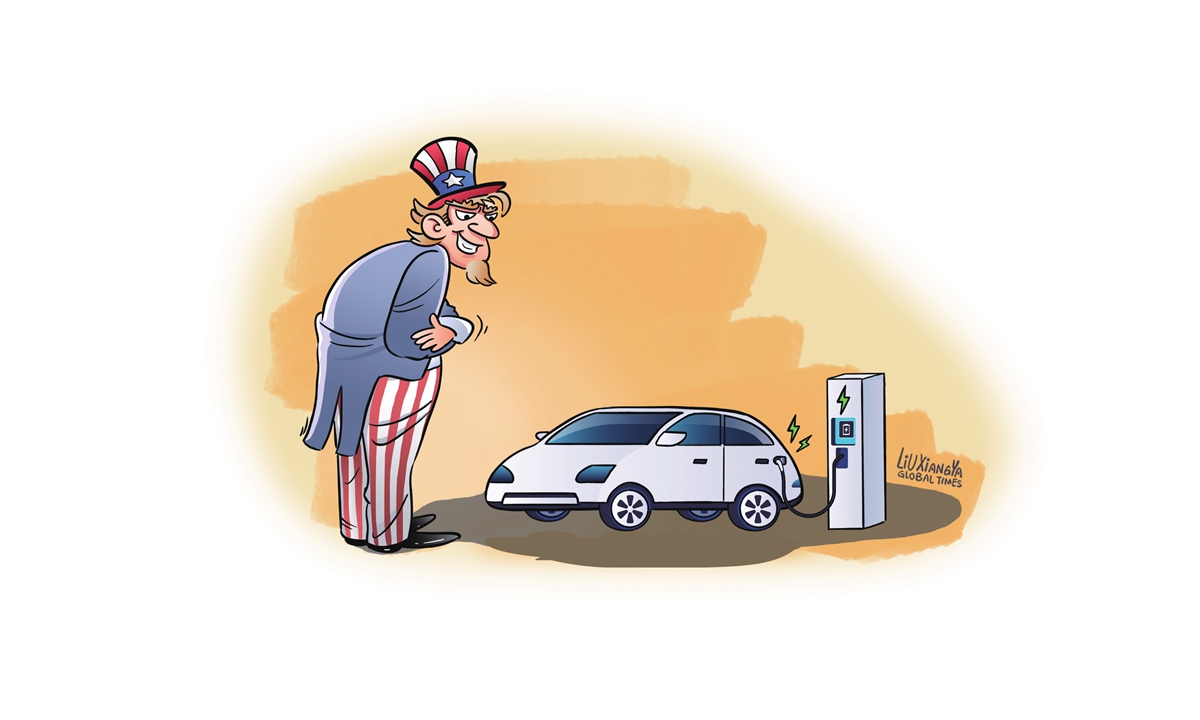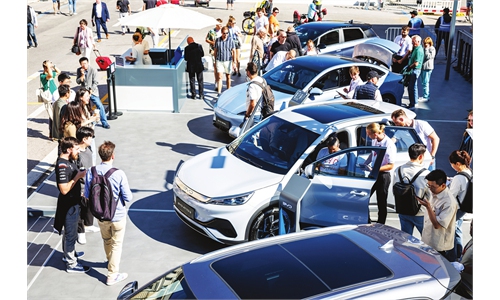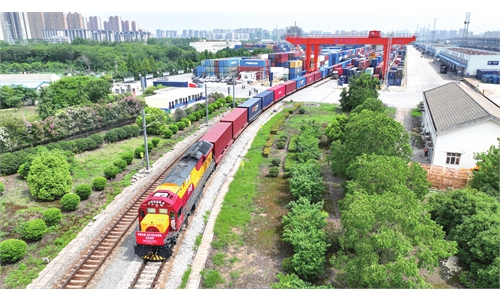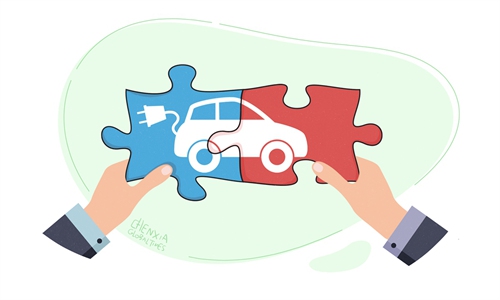Will the US reap the benefits of a possible EV conflict? It’s something for the EU to consider

Illustration: Liu Xiangya/Global Times
Several days after the European Commission launched an anti-subsidy investigation into Chinese electric vehicles (EVs), lithium-ion batteries have become a focus of public opinion. If Europe and China sink into a trade conflict with each other over EVs, there will be no winners, except the US.Europe's so-called over-dependence on Russian energy and Chinese lithium-ion batteries are entirely unrelated, but some Europeans may want to make meticulous comparison between the two. A document, prepared for EU leaders and was seen by Reuters, said the EU could become as dependent on China for lithium-ion batteries and fuel cells by 2030 as it was on Russia for energy before the Russia-Ukraine conflict unless it takes strong measures. Should Europe take action? First, let's take a look at what had happened before with Russian energy.
Europe's efforts to reduce its dependence on Russian energy have had a dramatic end. As reported by CNN, 18 percent of the bloc's crude imports came from the US in December 2022, making the country the biggest supplier of crude oil to the EU. Washington becomes the biggest winner of Europe's efforts to remove Russia's crude oil from their energy mix. What Europe has gained in this process? The answer is high energy prices, cost-of-living crises, and stubborn inflation.
Will the similar scenario emerge if actions are taken to reduce Europe's so-called over-dependence on made-in-China lithium-ion batteries and fuel cells?
The US views the battery industry as a core pillar of economic competitiveness and national security. When it comes to lithium-ion batteries, Washington has an unrealistic geopolitical ambition to decouple from China and build a US-centric global supply chains.
Currently, lithium-ion batteries are the dominant type of rechargeable batteries used in EVs. These EV battery chemistries depend on several critical minerals including lithium, cobalt and manganese. The US is entering an array of agreements and keening on forming new alliances and small circles to secure its access to critical minerals, which reflect Washington's selfish goals and ambitions.
Nikkei Asia reported in August that Japanese companies are moving to increase battery material production in North America for electric vehicles, hoping to capitalize on the US push to build a local EV supply chain. A series of subsidy policies that aimed to stimulate new investment played a big role in supporting the industrial chain restructuring, but it cannot help US EV and battery manufacturing industries build up real competitiveness. It is undeniable that long-term competitiveness of US manufacturing is at risk. So, Washington's ambition to build a US-centric supply chains is expected to face many challenges, and the biggest one is perhaps the lack of price competitiveness.
Compared to Russian energy, US crude oil does not have a price advantage, but the US has already overtaken Russia to become Europe's largest crude oil supplier. Regrettably, some European economies have seen a cost-of-living crisis and have now been struck by ongoing inflation. European countries should consider why the US can successfully dump high-priced energy products to the continent. So next, will Europe still willingly pay for US export of manufacturing products that are not cost-effective?
If economic issues can be politicized, disrupting China-EU supply chain, will such moves bring some opportunities for the US EV and battery industries? Of course, Washington hopes the answer is yes. However, we advise Europe not to fall into this trap. Hopefully European policymakers can respect market choices, support free trade, and allow European companies to vote with feet by choosing cost advantage. It is the only way Europe can maximize its own economic interests.
The economic complementarity and comprehensive trade and economic cooperation serve as a key piece in the jigsaw for China-EU relations. Both sides should continue to jointly reject protectionism. It is not too late for the EU to change its trade protectionism practices and prevent the two sides from falling into ongoing EV trade disputes.
The author is a reporter with the Global Times. bizopinion@globaltimes.com.cn



